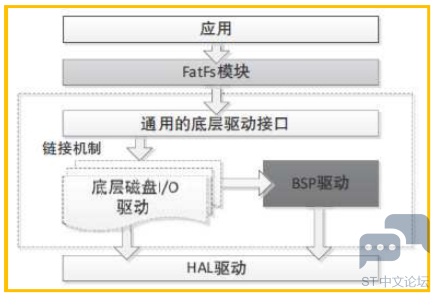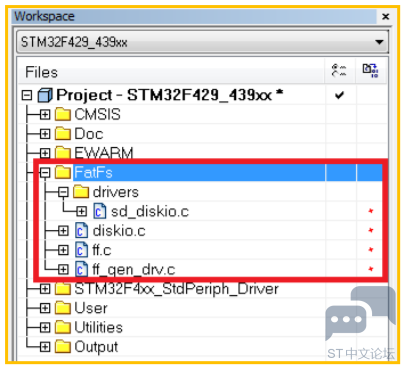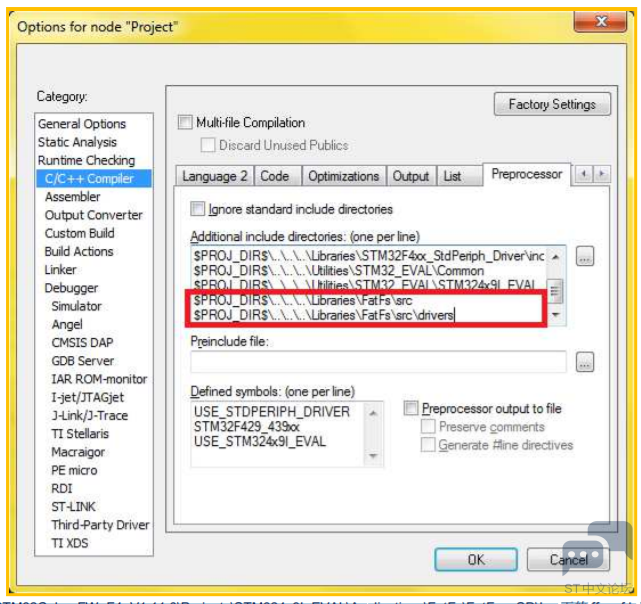前言
在很多应用中,文件系统被用来在存储介质上进行存储和管理文件数据。FatFs 作为面向小型嵌入式系统的一种通用 FAT 文件系统,被广泛使用。在 STM32Cube 库中,Middleware 是包含有 FatFs 文件系统的,而且有相关的例程。但是在标准外设库并没有相关的例程,这使得在使用标准外设库在开发项目中使用文件系统的话,需要自己再移植代码。其实,从STM32Cube 库向标准外设库移植 FatFs 文件系统很方便,简单实用。下面我们以 STM32F4 系列为例,来介绍一下 SD 卡的移植。
STM32CubeF4库中的 FatFs
大家都知道,进行 FatFs 移植主要就是在 diskio.c 中添加底层驱动代码。在 STM32CubeF4 库中,可以在\STM32Cube_FW_F4_V1.11.0\Middlewares\Third_Party\FatFs\src 找到 FatFs R0.11 的代码,细心的工程师会发现,里边的文件与从 FatFs 下载的 FatFs R0.11 不太一样,多了 ff_gen_drv.c 和 ff_gen_drv.h 两个文件,并且多了一个包含多种存储介质驱动的 driver 文件夹。这是因为 ST 的工程师在 FatFs 的代码中,已经为大家添加了各种存储介质的驱动代码,以方便大家使用,并使用 ff_gen_drv.c 来进行管理。所以,STM32CubeF4 的 FatFs 中间件模块架构如下:

从架构图可知,在 STM32CubeF4 解决方案中,已经添加额外的接口层,可以动态地添加/删除 FatFs 模块的物理介质。如需以底层磁盘 I/O 驱动来连接 FatFs 模块,用户可以使用 FATFS_LinkDriver()和 FATFS_UnLinkDriver() 动态地添加或者删除磁盘 I/O 驱动;应用程序可能需要知道当前连接的磁盘 I/O 驱动数量,这一点可通过 FATFS_GetAttachedDriversNbr() API 来实现。这让我们在管理物理介质更为方便。这三个函数就位于 ff_gen_drv.c 中。以 SD 卡为例,原本的“diskio.c”分化为“diskio.c + ff_gen_drv.c + \drivers\sd_diskio.c”三个文件,虽然文件增加了,但是条理更加清晰。具体的介绍可以参考用户手册 UM1721《在 STM32Cube 上开发 FatFs 相关应用》,这里不作详述。看完 UM1721,接下来可以开始动手实现了。
一实现环境
开发板: STM32439I-EVAL (MCU: STM32F439NIH6)
开发环境: STM32Cube_FW_F4_V1.11.0
STM32F4xx_DSP_StdPeriph_Lib_V1.6.1
IDE: IAR Embedded Workbench for ARM v7.50.1.10273
二实现步骤
1.在标准外设库上建立项目文件,确保 SD 卡可正常工作
1) 在\STM32F4xx_DSP_StdPeriph_Lib_V1.6.1\Project 下复制 STM32F4xx_StdPeriph_Templates 并将文件夹更名为 FatFs_uSD
2) 将\STM32F4xx_DSP_StdPeriph_Lib_V1.6.1\Project\STM32F4xx_StdPeriph_Examples\SDIO\SDIO_uSDCard 下的文件复制到 FatFs_uSD 替换掉原有文件
3) 打开 EWARM 下面的项目文件,在项目文件中添加\Utilities\STM32_EVAL\STM324x9I_EVAL 文件组,并加入stm324x9i_eval.c、stm324x9i_eval_ioe16.c、stm324x9i_eval_sdio_sd.c,如图:
![)G]@)7`2NTZ)I6{Y9AA@D2T.png )G]@)7`2NTZ)I6{Y9AA@D2T.png](data/attachment/forum/202203/03/221047gxnnzn2nb22f22g2.png)
4) 在 main.h 中将 include 中的代码加入 STM324x9I 的信息,更新为
- #if defined (USE_STM324xG_EVAL)
- #include "stm324xg_eval.h"
- #include "stm324xg_eval_sdio_sd.h"
- #elif defined (USE_STM324x7I_EVAL)
- #include "stm324x7i_eval.h"
- #include "stm324x7i_eval_sdio_sd.h"
- #elif defined (USE_STM324x9I_EVAL)
- #include "stm324x9i_eval.h"
- #include "stm324x9i_eval_sdio_sd.h"
- #else
- #error "Please select first the Evaluation board used in your application (in Project
- Options)"
- #endif
5) 编译,成功。下载运行,可见 LED1、LED2 和 LED3 点亮,证明 SD 卡读写正常。此步骤的目的在于首先要确保 SDIO 读写 SD 卡是正常的。
2.移植 FatFs 代码
1) 将\STM32Cube_FW_F4_V1.11.0\Middlewares\Third_Party\下的 FatFs 文件夹复制到 \STM32F4xx_DSP_StdPeriph_Lib_V1.6.1\Libraries
2) 打开之前的项目,在项目中添加 FatFs 文件组,加入\drivers\sd_diskio.c、diskio.c、ff.c 和 ff_gen_drv.c,如图:

3) 打开 Project Options,在 C/C++ Compiler 的 Preprocessor 页面添加 FatFs 使用的头文件的地址: $PROJ_DIR$\..\..\..\Libraries\FatFs\src 和$PROJ_DIR$\..\..\..\Libraries\FatFs\src\drivers,如下:

4) 复制\STM32Cube_FW_F4_V1.11.0\Projects\STM324x9I_EVAL\Applications\FatFs\FatFs_uSD\Inc 下的 ffconf.h 到\STM32F4xx_DSP_StdPeriph_Lib_V1.6.1\Project\Fatfs_uSDcard
5) 修改 ffconf.h,删掉第 15 行的 “#include "stm32f4xx_hal.h"”,将第 18 行的“#include "stm324x9i_eval_sd.h"”改为 “#include "stm324x9i_eval_sdio_sd.h"”
6) 修改 sd_diskio.c,这是整个移植最关键的地方。
a. DSTATUS SD_initialize(BYTE lun)
STM32CubeF4 中的 BSP_SD_Init()对应于标准外设库的 SD_Init(),MSD_OK 对应于 SD_OK。此函数修改为:
- DSTATUS SD_initialize(BYTE lun)
- {
- Stat = STA_NOINIT;
- /* Configure the uSD device */
- if(SD_Init() == SD_OK)
- {
- Stat &= ~STA_NOINIT;
- }
- return Stat;
- }
b. DSTATUS SD_status(BYTE lun)
STM32CubeF4 中的 BSP_SD_GetStatus ()对应于标准外设库的 SD_GetStatus() ()。此函数修改为:
- DSTATUS SD_status(BYTE lun)
- {
- Stat = STA_NOINIT;
- if(SD_GetStatus() == SD_TRANSFER_OK)
- {
- Stat &= ~STA_NOINIT;
- }
- return Stat;
- }
c. DRESULT SD_read(BYTE lun, BYTE *buff, DWORD sector, UINT count)
在 STM32CubeF4 中,BSP_SD_ReadBlocks()函数调用 HAL_SD_ReadBlocks(),而 HAL_SD_ReadBlocks()已经针对读取单个 Block 和多个 Block 进行了处理。而在标准外设库中没有这样的函数,单个 Block 的读取使用SD_ReadBlock()函数,多个 Block 的读取使用 SD_ReadMultiBlocks()函数。所以,这个函数需要修改为:
- DRESULT SD_read(BYTE lun, BYTE *buff, DWORD sector, UINT count)
- {
- DRESULT res = RES_OK;
- if (count > 1)
- {
- /* Read multiple block */
- if(SD_ReadMultiBlocks((uint8_t *)buff,
- (uint64_t) (sector * BLOCK_SIZE),
- BLOCK_SIZE,
- count) != SD_OK)
- return RES_ERROR;
- /* Check if the Transfer is finished */
- if(SD_WaitReadOperation() != SD_OK)
- return RES_ERROR;
- while(SD_GetStatus() != SD_TRANSFER_OK);
- }
- else
- {
- /* Read block */
- if(SD_ReadBlock((uint8_t *)buff,
- (uint64_t) (sector * BLOCK_SIZE),
- BLOCK_SIZE) != SD_OK)
- return RES_ERROR;
- /* Check if the Transfer is finished */
- if(SD_WaitReadOperation() != SD_OK)
- return RES_ERROR;
- while(SD_GetStatus() != SD_TRANSFER_OK);
- }
- return res;
- }
d. DRESULT SD_write(BYTE lun, const BYTE *buff, DWORD sector, UINT count)
SD_write()的修改和 SD_read()一样,需要分别对单个 Block 和多个 Block 进行处理。函数修改为:
- DRESULT SD_write(BYTE lun, const BYTE *buff, DWORD sector, UINT count)
- {
- DRESULT res = RES_OK;
- if (count > 1)
- {
- /* Write multiple block */
- if(SD_WriteMultiBlocks((uint8_t *)buff,
- (uint64_t) (sector * BLOCK_SIZE),
- BLOCK_SIZE,
- count) != SD_OK)
- return RES_ERROR;
- /* Check if the Transfer is finished */
- if(SD_WaitWriteOperation() != SD_OK)
- return RES_ERROR;
- while(SD_GetStatus() != SD_TRANSFER_OK);
- }
- else
- {
- /* Write block */
- if(SD_WriteBlock((uint8_t *)buff,
- (uint64_t) (sector * BLOCK_SIZE),
- BLOCK_SIZE) != SD_OK)
- return RES_ERROR;
- /* Check if the Transfer is finished */
- if(SD_WaitWriteOperation() != SD_OK)
- return RES_ERROR;
- while(SD_GetStatus() != SD_TRANSFER_OK);
- }
- return res;
- }
e. DRESULT SD_ioctl(BYTE lun, BYTE cmd, void *buff)
STM32CubeF4 中的 BSP_SD_GetCardInfo()对应于标准外设库的 SD_GetCardInfo()。此函数修改为:
- DRESULT SD_ioctl(BYTE lun, BYTE cmd, void *buff)
- {
- DRESULT res = RES_ERROR;
- SD_CardInfo CardInfo;
- if (Stat & STA_NOINIT) return RES_NOTRDY;
- switch (cmd)
- {
- /* Make sure that no pending write process */
- case CTRL_SYNC :
- res = RES_OK;
- break;
- /* Get number of sectors on the disk (DWORD) */
- case GET_SECTOR_COUNT :
- SD_GetCardInfo(&CardInfo);
- *(DWORD*)buff = CardInfo.CardCapacity / BLOCK_SIZE;
- res = RES_OK;
- break;
- /* Get R/W sector size (WORD) */
- case GET_SECTOR_SIZE :
- *(WORD*)buff = BLOCK_SIZE;
- res = RES_OK;
- break;
- /* Get erase block size in unit of sector (DWORD) */
- case GET_BLOCK_SIZE :
- *(DWORD*)buff = BLOCK_SIZE;
- break;
- default:
- res = RES_PARERR;
- }
- return res;
- }
至此,编译可通过,FatFs 的移植已算完成。接下来,是修改测试代码。
7) 修改 main.c。参考\STM32Cube_FW_F4_V1.11.0\Projects\STM324x9I_EVAL\Applications\FatFs\FatFs_uSD\Src\main.c,修改此文件,如下:
- /* Includes ------------------------------------------------------------------*/
- #include "main.h"
- /** @addtogroup STM32F4xx_StdPeriph_Examples
- * @{
- */
- /** @addtogroup SDIO_uSDCard
- * @{
- */
- /* Private typedef -----------------------------------------------------------*/
- typedef enum {FAILED = 0, PASSED = !FAILED} TestStatus;
- /* Private define ------------------------------------------------------------*/
- /* Private macro -------------------------------------------------------------*/
- /* Private variables ---------------------------------------------------------*/
- FATFS SDFatFs; /* File system object for SD card logical drive */
- FIL MyFile; /* File object */
- char SDPath[4]; /* SD card logical drive path */
- /* Private function prototypes -----------------------------------------------*/
- static void NVIC_Configuration(void);
- static void Error_Handler(void);
- /* Private functions ---------------------------------------------------------*/
- /**
- * @brief Main program
- * @param None
- * @retval None
- */
- int main(void)
- {
- /*!< At this stage the microcontroller clock setting is already configured,
- this is done through SystemInit() function which is called from startup
- files (startup_stm32f40_41xxx.s/startup_stm32f427_437xx.s)
- before to branch to application main. To reconfigure the default setting
- of SystemInit() function, refer to system_stm32f4xx.c file
- */
- FRESULT res; /* FatFs function common result
- code */
- uint32_t byteswritten, bytesread; /* File write/read counts */
- uint8_t wtext[] = "STM32 with FatFs demo @ std lib"; /* File write buffer */
- uint8_t rtext[100]; /* File read buffer */
- /* Initialize LEDs available on EVAL board */
- STM_EVAL_LEDInit(LED1);
- STM_EVAL_LEDInit(LED3);
- /* NVIC Configuration */
- NVIC_Configuration();
- /*##-1- Link the micro SD disk I/O driver ##################################*/
- if(FATFS_LinkDriver(&SD_Driver, SDPath) == 0)
- {
- /*##-2- Register the file system object to the FatFs module ##############*/
- if(f_mount(&SDFatFs, (TCHAR const*)SDPath, 0) != FR_OK)
- {
- /* FatFs Initialization Error */
- Error_Handler();
- }
- else
- {
- /*##-3- Create a FAT file system (format) on the logical drive #########*/
- /* WARNING: Formatting the uSD card will delete all content on the device */
- if(f_mkfs((TCHAR const*)SDPath, 0, 0) != FR_OK)
- {
- /* FatFs Format Error */
- Error_Handler();
- }
- else
- {
- /*##-4- Create and Open a new text file object with write access #####*/
- if(f_open(&MyFile, "STM32STD.TXT", FA_CREATE_ALWAYS | FA_WRITE) != FR_OK)
- {
- /* 'STM32STD.TXT' file Open for write Error */
- Error_Handler();
- }
- else
- {
- /*##-5- Write data to the text file ################################*/
- res = f_write(&MyFile, wtext, sizeof(wtext), (void *)&byteswritten);
- if((byteswritten == 0) || (res != FR_OK))
- {
- /* 'STM32STD.TXT' file Write or EOF Error */
- Error_Handler();
- }
- else
- {
- /*##-6- Close the open text file #################################*/
- f_close(&MyFile);
- /*##-7- Open the text file object with read access ###############*/
- if(f_open(&MyFile, "STM32STD.TXT", FA_READ) != FR_OK)
- {
- /* 'STM32STD.TXT' file Open for read Error */
- Error_Handler();
- }
- else
- {
- /*##-8- Read data from the text file ###########################*/
- res = f_read(&MyFile, rtext, sizeof(rtext), (UINT*)&bytesread);
- if((bytesread == 0) || (res != FR_OK))
- {
- /* 'STM32STD.TXT' file Read or EOF Error */
- Error_Handler();
- }
- else
- {
- /*##-9- Close the open text file #############################*/
- f_close(&MyFile);
- /*##-10- Compare read data with the expected data ############*/
- if((bytesread != byteswritten))
- {
- /* Read data is different from the expected data */
- Error_Handler();
- }
- else
- {
- /* Success of the demo: no error occurrence */
- STM_EVAL_LEDOn(LED1);
- }
- }
- }
- }
- }
- }
- }
- }
- /*##-11- Unlink the micro SD disk I/O driver ###############################*/
- FATFS_UnLinkDriver(SDPath);
- /* Infinite loop */
- while (1)
- {
- }
- }
- /**
- * @brief Configures SDIO IRQ channel.
- * @param None
- * @retval None
- */
- static void NVIC_Configuration(void)
- {
- NVIC_InitTypeDef NVIC_InitStructure;
- /* Configure the NVIC Preemption Priority Bits */
- NVIC_PriorityGroupConfig(NVIC_PriorityGroup_1);
- NVIC_InitStructure.NVIC_IRQChannel = SDIO_IRQn;
- NVIC_InitStructure.NVIC_IRQChannelPreemptionPriority = 0;
- NVIC_InitStructure.NVIC_IRQChannelSubPriority = 0;
- NVIC_InitStructure.NVIC_IRQChannelCmd = ENABLE;
- NVIC_Init(&NVIC_InitStructure);
- NVIC_InitStructure.NVIC_IRQChannel = SD_SDIO_DMA_IRQn;
- NVIC_InitStructure.NVIC_IRQChannelPreemptionPriority = 1;
- NVIC_Init(&NVIC_InitStructure);
- }
- /**
- * @brief This function is executed in case of error occurrence.
- * @param None
- * @retval None
- */
- static void Error_Handler(void)
- {
- /* Turn LED3 on */
- STM_EVAL_LEDOn(LED3);
- while(1)
- {
- }
- }
- #ifdef USE_FULL_ASSERT
- /**
- * @brief Reports the name of the source file and the source line number
- * where the assert_param error has occurred.
- * @param file: pointer to the source file name
- * @param line: assert_param error line source number
- * @retval None
- */
- void assert_failed(uint8_t* file, uint32_t line)
- {
- /* User can add his own implementation to report the file name and line number,
- ex: printf("Wrong parameters value: file %s on line %d\r\n", file, line) */
- /* Infinite loop */
- while (1)
- {
- }
- }
- #endif
- /* FatFs includes component */
- #include "ff_gen_drv.h"
- #include "sd_diskio.h"
此主函数实现功能为:创建 STM32STD.TXT 文件,并向其写入“STM32 with FatFs demo @ std lib”
8) 编译,成功。
3.测试
1) 连接 STM32439I-EVAL 到 PC
2) 打开工程,下载代码并运行,LED1 点亮,代表运行通过。
3) 将 SD 卡从 STM32439I-EVAL 取出,放入 PC 进行读取,可见:
![RIW0SYF]40H62D6F6G9I(H4.png RIW0SYF]40H62D6F6G9I(H4.png](data/attachment/forum/202203/03/221048i4mwun0mu5s5xgmt.png)
4) 打开 STM32STD.TXT,可见:
![]LQTA@JB){ZS5Q@]U882S76.png ]LQTA@JB){ZS5Q@]U882S76.png](data/attachment/forum/202203/03/221047shb11hlfb6hw7phz.png)
5) 测试结果:成功。
结论
此文档介绍从 STM32CubeF4 中将 FatFs 文件系统移植到标准外设库的实现过程。另外,对于时间接口函数,有需要的读者可自行进行移植。
|

.png) STMCU小助手
发布时间:2022-3-3 22:09
STMCU小助手
发布时间:2022-3-3 22:09

![)G]@)7`2NTZ)I6{Y9AA@D2T.png )G]@)7`2NTZ)I6{Y9AA@D2T.png](data/attachment/forum/202203/03/221047gxnnzn2nb22f22g2.png)


![RIW0SYF]40H62D6F6G9I(H4.png RIW0SYF]40H62D6F6G9I(H4.png](data/attachment/forum/202203/03/221048i4mwun0mu5s5xgmt.png)
![]LQTA@JB){ZS5Q@]U882S76.png ]LQTA@JB){ZS5Q@]U882S76.png](data/attachment/forum/202203/03/221047shb11hlfb6hw7phz.png)
 微信公众号
微信公众号
 手机版
手机版
